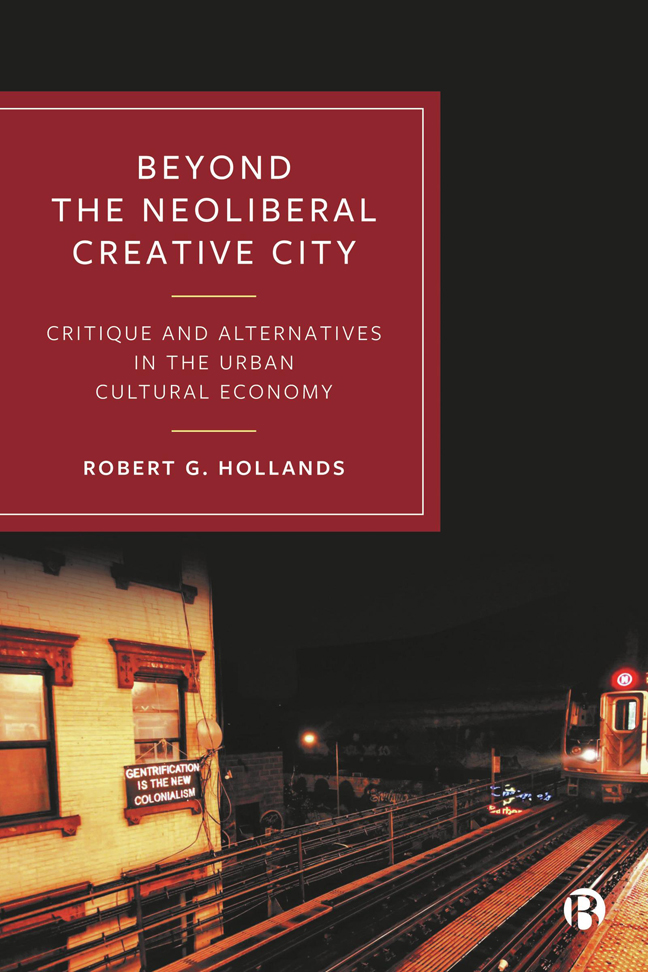Book contents
- Frontmatter
- Dedication
- Contents
- List of Figures, Tables and Case Studies
- About the Author
- Preface
- 1 Neoliberalism, Creativity and Cities
- 2 Urban Entrepreneurialism: The Emergence of the Cultural Economy
- 3 Critiquing the Neoliberal Creative City: But Long Live Alternative Creative Spaces!
- 4 Urban Cultural Movements and Anti-Creative Struggles
- 5 Neoliberal Nightlife and its Alternatives
- 6 Rethinking the Tourist City: Contestation and Alternative Cultural Tourism
- 7 Creative Polarization, Division and Exclusion
- 8 Beyond the Neoliberal Creative City
- Notes
- References
- Index
6 - Rethinking the Tourist City: Contestation and Alternative Cultural Tourism
Published online by Cambridge University Press: 25 January 2024
- Frontmatter
- Dedication
- Contents
- List of Figures, Tables and Case Studies
- About the Author
- Preface
- 1 Neoliberalism, Creativity and Cities
- 2 Urban Entrepreneurialism: The Emergence of the Cultural Economy
- 3 Critiquing the Neoliberal Creative City: But Long Live Alternative Creative Spaces!
- 4 Urban Cultural Movements and Anti-Creative Struggles
- 5 Neoliberal Nightlife and its Alternatives
- 6 Rethinking the Tourist City: Contestation and Alternative Cultural Tourism
- 7 Creative Polarization, Division and Exclusion
- 8 Beyond the Neoliberal Creative City
- Notes
- References
- Index
Summary
In Chapter 2 it was noted that Harvey (1989a: 9) highlighted tourism as a significant entrepreneurial urban strategy for ailing cities. More recently, Hutton (2016: 66) further asserts that while tourism has always had a cultural dimension, over the last couple of decades ‘cultural tourism’ has experienced dramatic growth. As such, it has become a key urban branding tool for the neoliberal creative city.
As the creative economy has expanded globally, so too has the growth in tourism moved far beyond traditional destinations of the late 19th and early 20th centuries, like Paris, New York or London. In Europe, cities which historically have not experienced tourism previously, like Barcelona, Berlin and Prague, were by the millennium quickly becoming cultural meccas. Creative North American cities like Los Angeles, San Francisco and Chicago now vie with New York for the best tourism experience. Globally there is an avalanche of cities promoting tourism with reference to their cultural assets and creative infrastructure. In the Global South, Rio de Janeiro rose to prominence hosting the 2016 Olympic Games and attracting 1.17 million tourists during that two-week period (Kalvapalle, 2016). Hong Kong attracts 29 million visitors a year, topping the list of Asian cities, while Singapore, a city known to eagerly embraced the creativity paradigm (Luger, 2019), is ranked fourth in terms of tourist numbers with nearly 19 million visitors (Ganbold, 2022).
Despite its obvious economic benefits, growth in this sector has resulted in a rise in discontent around tourism-related issues in cities in recent years (Novy and Colomb, 2018). This signals the need for change and alternative policy solutions. While this issue has been represented most publicly by protests against noise, overcrowding, rent rises and public disorder, underlying these more ‘visible’ problems is the displacement and gentrification of many traditional city neighbourhoods via tourism (Salerno, 2022). Urban artists may clearly benefit from tourism but they can also be impacted negatively by many of the issues just mentioned. The pandemic also called into question neoliberal urban development strategies based around a continual growth model of tourism, while the climate crisis also disputes the sustainability of this particular sector of the cultural economy (Higgins-Desbiolles, 2020).
This chapter examines tourism within the context of the neoliberal creative city, outlining its characteristics and shortcomings. It also focuses on examples of opposition and the need for alternatives.
- Type
- Chapter
- Information
- Beyond the Neoliberal Creative CityCritique and Alternatives in the Urban Cultural Economy, pp. 113 - 132Publisher: Bristol University PressPrint publication year: 2023



